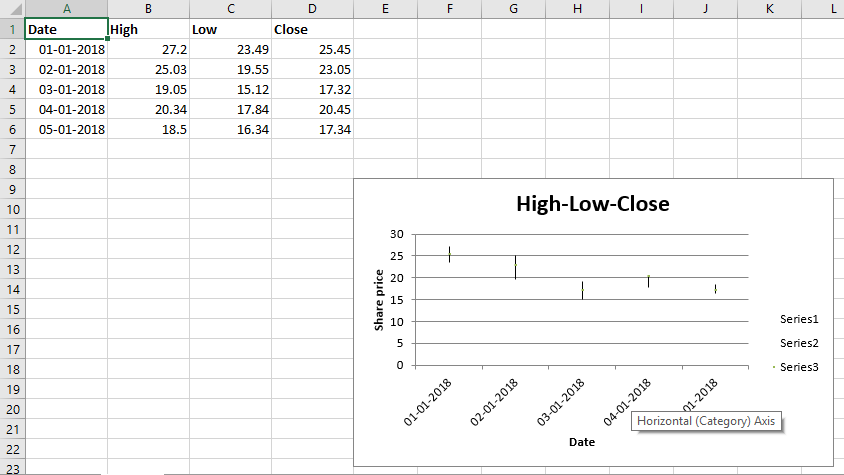Python|使用 XlsxWriter 模块在 Excel 工作表中绘制股票图表
先决条件:在 Excel 工作表上创建和书写
XlsxWriter是一个Python库,使用它可以对 excel 文件执行多种操作,例如创建、写入、算术运算和绘图。让我们看看如何使用实时数据绘制股票图表。
图表由至少一系列的一个或多个数据点组成。系列本身由对单元格范围的引用组成。为了在 Excel 表上绘制图表,首先,创建特定图表类型的图表对象(即股票图表等)。创建图表对象后,在其中插入数据,最后,将该图表对象添加到工作表对象中。
代码:绘制股票图表。
要在 Excel 工作表上绘制股票图表,请使用add_chart()方法和工作簿对象的类型“股票”关键字参数。
Python3
# from datetime library import datetime method
from datetime import datetime
# import xlsxwriter library
import xlsxwriter
# Workbook() takes one, non-optional, argument
# which is the filename that we want to create.
workbook = xlsxwriter.Workbook('chart_stock.xlsx')
# The workbook object is then used to add new
# worksheet via the add_worksheet() method.
worksheet = workbook.add_worksheet()
# Create a new Format object to formats cells
# in worksheets using add_format() method .
# here we create bold format object .
bold = workbook.add_format({'bold': 1})
# here we create date format object
date_format = workbook.add_format({'num_format': 'dd/mm/yyyy'})
# Create a chart object that can be added
# to a worksheet using add_chart() method.
# here we create a stock chart object .
chart = workbook.add_chart({'type': 'stock'})
# Add the worksheet data that the charts will refer to.
headings = ['Date', 'High', 'Low', 'Close']
data = [
['2018-01-01', '2018-01-02', '2018-01-03', '2018-01-04', '2018-01-05'],
[27.2, 25.03, 19.05, 20.34, 18.5],
[23.49, 19.55, 15.12, 17.84, 16.34],
[25.45, 23.05, 17.32, 20.45, 17.34],
]
# Write a row of data starting from 'A1'
# with bold format .
worksheet.write_row('A1', headings, bold)
# Filling the data in an excel sheet
for row in range(5):
# convert a string type date into date of respective format.
date = datetime.strptime(data[0][row], "% Y-% m-% d")
# apply a date_format object on this particular cell
worksheet.write(row + 1, 0, date, date_format)
# write data in the respective cells
worksheet.write(row + 1, 1, data[1][row])
worksheet.write(row + 1, 2, data[2][row])
worksheet.write(row + 1, 3, data[3][row])
# width of A to D column set to 11.
worksheet.set_column('A:D', 11)
# Add a series for each of the High-Low-Close columns.
# Add a data series to a chart
# using add_series method.
# note : spaces is not inserted in b / w
# = and Sheet1, Sheet1 and !
# if space is inserted it throws warning.
# data take from A2 to A6 and B2 to B6 respectively.
chart.add_series({
'categories': '= Sheet1 !$A$2:$A$6',
'values': '= Sheet1 !$B$2:$B$6',
})
# data take from A2 to A6 and C2 to C6 respectively.
chart.add_series({
'categories': '= Sheet1 !$A$2:$A$6',
'values': '= Sheet1 !$C$2:$C$6',
})
# data take from A2 to A6 and D2 to D6 respectively.
chart.add_series({
'categories': '= Sheet1 !$A$2:$A$6',
'values': '= Sheet1 !$D$2:$D$6',
})
# Add a chart title
chart.set_title ({'name': 'High-Low-Close'})
# Add x-axis label
chart.set_x_axis({'name': 'Date'})
# Add y-axis label
chart.set_y_axis({'name': 'Share price'})
# add chart to the worksheet with given
# offset values at the top-left corner of
# a chart is anchored to cell E9
worksheet.insert_chart('E9', chart)
# Finally, close the Excel file
# via the close() method.
workbook.close()
输出:
